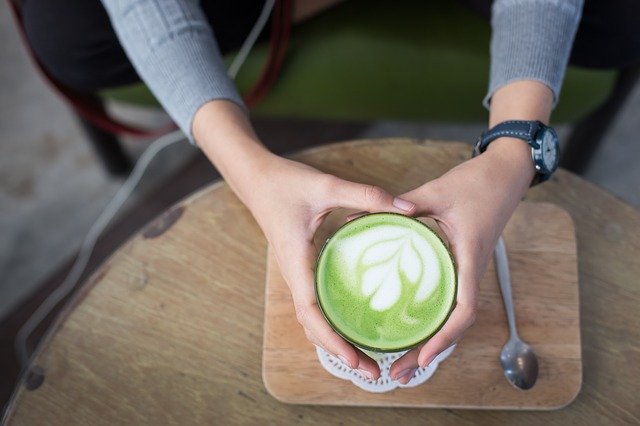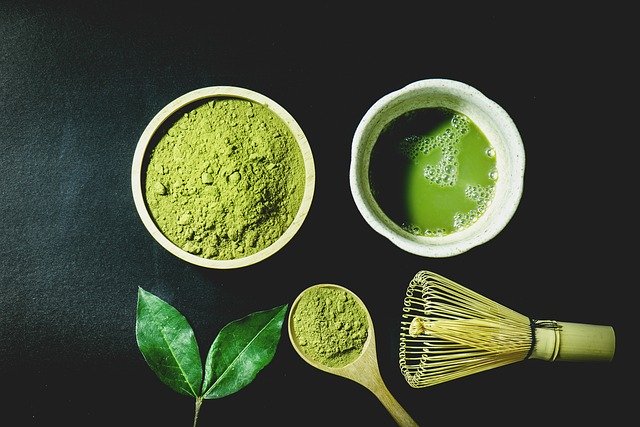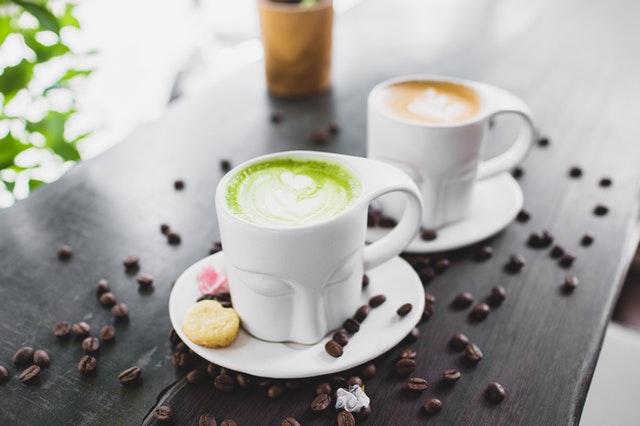Matcha is the new buzzword in coffee shops, with many places offering everything from matcha lattes to iced matcha drinks. There’s more to this millennial tea than its unique color. It’s packed with caffeine and healthy antioxidants. Is matcha tea better for you than coffee?
What Is Matcha?
The first thing I learned is that matcha isn’t just another name for green tea. While it’s true that matcha comes from tea leaves, it’s very different from your normal cup of green tea.
People make green tea by steeping tea leaves (many brands include stems too) in water. On the other hand, matcha refers to the tea leaves themselves ground up into a fine powder. When you drink a cup of matcha tea, you’re not getting a watered-down version of the nutrients in tea leaves; you’re getting all of the antioxidants possible.

How Much Caffeine Does Matcha Tea Have?
First, a confession. I NEED caffeine. My daily dose of caffeine keeps me focused and gives me energy when I feel myself tiring out. Moms with kids, you know exactly what I’m talking about, especially when little ones keep us awake at night.
How does matcha compare to coffee in the caffeine department? It’s phenomenal. One shot of matcha contains the same amount of caffeine as a cup of coffee. However, matcha tea’s caffeine boost lasts longer! If you’re looking for a way to stay energized and alert at work or at home, matcha tea is a great choice.
What makes the caffeine in green tea powder special is that it doesn’t produce the nervous buzz or energy crash that you may experience with coffee. Matcha packs a one-two punch by combining caffeine (a natural stimulant) with L-Theanine (a natural relaxant). L-Theanine is an amino acid that calms you down without making you sleepy.
What Are the Benefits of Green Tea Powder?
Green tea leaves are a true superfood bursting with healthy antioxidants called catechins. Here are a few of the things these spectacular phytonutrients can do for your body:
To get the same amount of antioxidants as one cup of matcha tea, you would need to drink 10 cups of green tea and many cups of coffee! I can’t believe the difference in energy and mood that it gives me, and I love the taste.

How Do You Make Matcha Tea?
To prepare a basic cup of green tea using matcha powder, you just need to add 1 1/2 teaspoons of matcha tea to your cup and slowly pour 2 ounces of almost-but-not-quite boiling water over it. Then whisk the blend until it’s frothy. Viola, matcha tea!
Actually, this green powder is incredibly versatile. Sipping on piping hot matcha tea isn’t the only way to enjoy it. Try adding matcha powder to your favorite smoothie or snack on tasty Greek yogurt with matcha, bananas and almonds for an afternoon shot of energy.
Don’t get me wrong. There’s nothing bad about loving coffee (I do!). It’s just that matcha gives you more bang for your buck when it comes to health benefits. On that note, I recommend choosing high-quality matcha powder – it’s slightly sweet instead of bitter.



Sounds good please send me a “sample”. Thank you
Ray Manbert
203-328 The West Mall\
Toronto M9C 1C9
647-218-8099
Would like sample of matcha tea